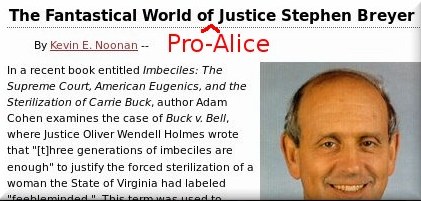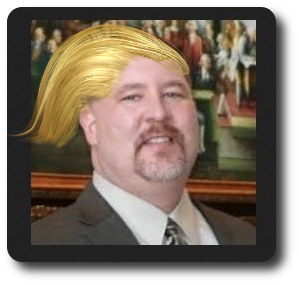

Justice Breyer was pro-Alice or in favour of what's now known as the Alice test that eliminates many software patents
SOME of our earliest articles about SCOTUS were quite critical of it; the same goes for the USPTO. But nearly a decade has passed and the United States is nicely reforming the patent system, led by key decisions from SCOTUS (decisions such as Alice and Mayo).
"...nearly a decade has passed and the United States is nicely reforming the patent system, led by key decisions from SCOTUS (decisions such as Alice and Mayo)."There are some important and relevant (to us) cases coming from SCOTUS, possibly with new Justices joining quite soon (following the death of Scalia and the change of political party in power). A loosely-closeted patent maximalist (disguised as academic) seemed rather bothered about the upcoming decisions. He wrote a lot about them recently, noting for instance that "Justice Breyer dissented – arguing that “for more than a century courts with virtual unanimity have applied laches in patent damages cases” in order to fill an important gap in the statutory regime." (regarding SCA Hygiene Prods. v First Quality Baby Prods)
He also wrote regarding the Lexmark case which we recently wrote about in light of the attacks on Justice Breyer. The patent maximalist quotes from this SCOTUS oral arguments [PDF]: "If you look it the Alice case, for example, that obviously had tremendous implications..."
"There are some important and relevant (to us) cases coming from SCOTUS, possibly with new Justices joining quite soon (following the death of Scalia and the change of political party in power)."Yes, fantastic implications to software developers, albeit negative for patent trolls, patent lawyers etc. (in other words, people who produce nothing of use)
SCOTUS will likely rule for common sense yet again, as it so persistently did in the patents domain (the composition of Justices is still very similar). Here is Watchtroll attempting to influence the outcome by giving the platform to "an associate in Womble Carlyle’s Intellectual Property Transactions Group." (i.e. patent microcosm).
 No doubt there will be a lot of lobbying to that effect in the coming days, weeks, and beyond.
No doubt there will be a lot of lobbying to that effect in the coming days, weeks, and beyond.
A great headline that we found earlier today said, "In Apple v. Samsung, SCOTUS Sided With Reason Over Rounded Corners"
"No doubt there will be a lot of lobbying to that effect in the coming days, weeks, and beyond."There may be more such decisions (regarding Apple and Samsung) heading into SCOTUS, with nearly billions of dollars hanging in the balance (for this case alone, irrespective of impact it would have on other, future cases). To quote the article: "After almost five years of legal volleying, the U.S. Supreme Court finally issued a decision in the highly anticipated Apple v. Samsung design patent case late last year. On Tuesday, Dec. 5, the court delivered a unanimous decision in favor of Samsung, finding that damages for design patent infringement may be limited to revenues attributable to a component of an article of manufacture rather than profits from the entire article. While this is an important victory for startups and innovators—from global corporations to inventors toiling in garages—courts must still work to provide the guidance and clarity necessary to prevent bad actors from abusing the patent system to the detriment of innovation. And they have a new opportunity to do so: On Feb. 7, the U.S. Court of Appeals for the Federal Circuit took a significant step in that direction by remanding the Apple v. Samsung case to the Northern District of California court."
We have been trying to figure out where a Justice Gorsuch (if appointed, not just nominated) would stand on patents, but it's still too much of a mystery [1, 2]. We have not yet seen any indication -- except perhaps this -- that Trump is going change course and attempt to reverse/undo the progress made. ⬆